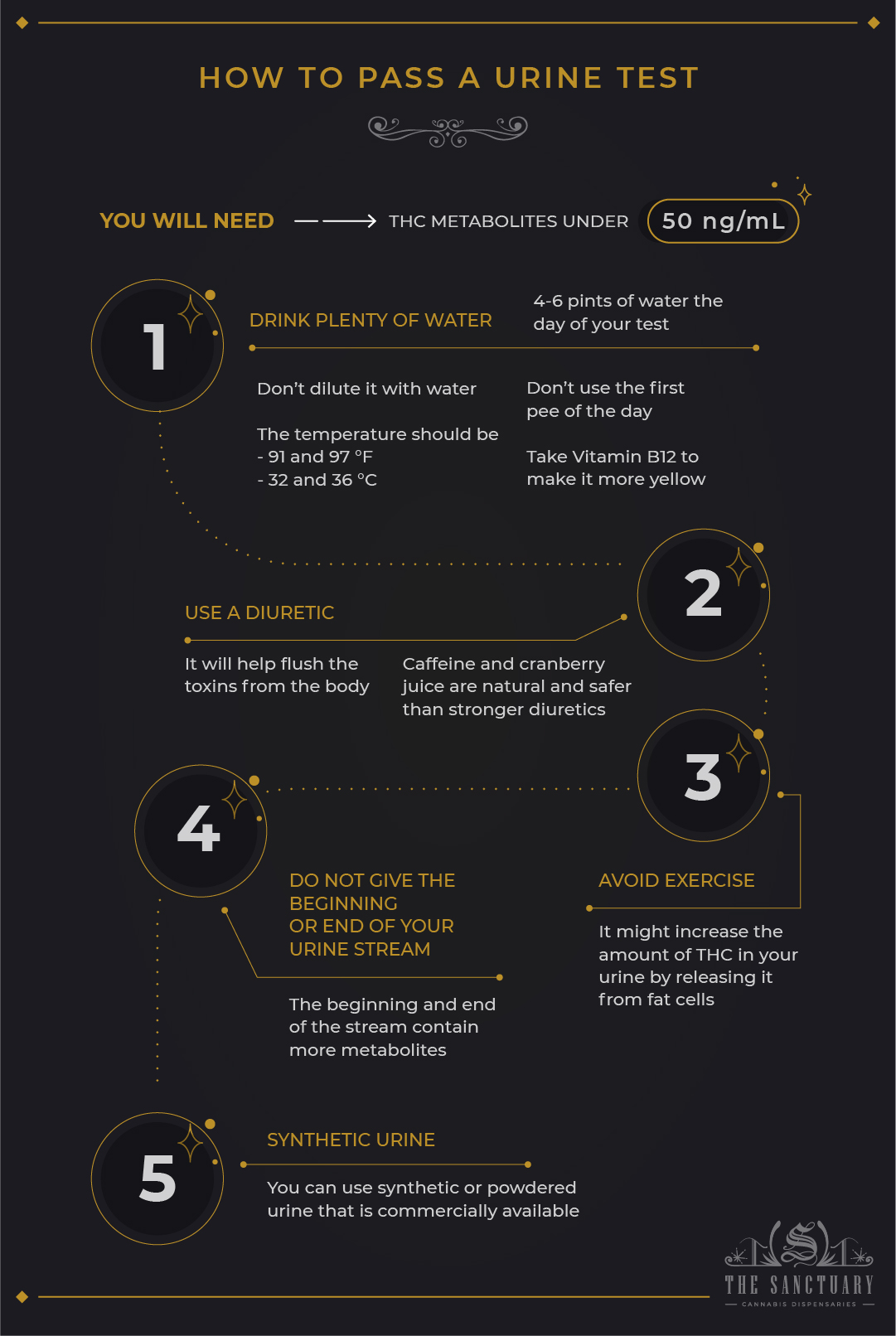Despite a legal weed renaissance, drug testing still remains a cloud over users’ heads. If you test positive either for a job application or for a job you currently hold then chances are you will not have that job for much longer.
Luckily, most drug tests that are administered are not completely random. There is usually some advanced notice, even if it is only 24 hours. In the span of 24 hours, there is a lot you can do to clean yourself out in time for a test.
How long does THC stay in your system?
There are a variety of factors that determines how long THC can stay in your system. Frequency of use and quantity are the main reasons that THC lingers in your system.
It is possible for first-time smokers to be clean of any THC metabolites in as soon as 5 days. For chronic users, THC can be found for 30 days or more since the last time they smoked.
What is THC-COOH?
Technically, drug tests are not looking for THC but rather THC-COOH which is a metabolite THC creates within the human body. This is because your body stores THC-COOH in your body longer than THC.
The official name for THC-COOH is 11-nor-9-carboxy-Δ⁹-tetrahydrocannabinol (also known as, 11-nor-9-carboxy-THC) which is read as “carboxy THC”.
Regardless of the consumption method, hydroxy-THC is the first metabolite formed in the human body and carboxy THC is the second metabolite of THC that is formed.
THC-COOH is stored in our lipid (fat) cells. This is the reason it lingers in our body for so long. Hydroxy-THC by contrast does not last in our system very long at all.
How much THC is in my body?
There are many factors that dictate the levels of THC-COOH remaining in your system after using cannabis.
- How often you consume: Frequency of use is possibly the biggest reason that THC could last in your system for so long. Whether you smoke once a day, week, or month, and if you are enjoying just a hit or smoking up to one or more joints. The more weed you consume, the more THC that is stored in your lipid cells.
- Total body fat: More body fat means more fatty cells and tissue that THC-COOH store themselves into.
- Metabolism and overall health: If you have less body fat, then less THC and its metabolites will be stored in your body. Your metabolism also plays an important role in breaking down the THC. Exercise over time can help break down your fat cells and release THC metabolites which then can be expelled through urination. Due to this, never exercise right before taking a drug test.
- What you are consuming: The weed product you consume such as flower vs. edibles or concentrates will alter the levels of THC-COOH present in your system. The stronger the product, the more THC you will have in your system.
Types of drug tests
There are many different methods of drug testing. These include urine, blood, hair, and saliva samples.
- Urinalysis: This is the most common sample to test for drugs. It is not expensive yet is still accurate and therefore is why many companies prefer to use this type of sampling. Roughly between 5-30 days is how long THC-COOH can show up on urine samples.
- Saliva test: Some companies are turning to faster and cheaper alternatives such as saliva drug testing for cannabis. This screening technique is used by employers, athletic associations, and even police units. Weed is detected in the saliva for about 24-72 hours.
- Blood test: It identifies THC-COOH in your bloodstream. Unlike a urine sample, a blood test can prove impairment. Blood tests can only detect THC for 3-4 hours.
- Hair test: This does take place in some workplaces, however, it is not very common. Hair tests are the most sensitive tests, detecting THC-COOH for up to 90 days after use.
How to pass a drug test at short notice
If you are surprised by a random drug test, your options for cheating may be limited. Urine tests are the easiest to cheat so if you are presented with any of the other kinds of tests then you may be out of luck.
If you have only 24 hours to pass a test then you can look to the market for some detox products. If you do not have time to order online, you could always try your local head shop, which may stock certain detox brands.
There are a few other tricks and tips you can use to try and pass a drug test in one day. However, you should note that none of these are guaranteed to work. The only way to pass a drug test for sure is to abstain for the appropriate length of time.
How to pass a urine test

You do not have to be completely free of THC to pass a test. To understand how to pass a urine test, first, we must discuss the thresholds of THC levels that determine a pass or fail. This threshold is 50 ng/mL; this is actually a higher level than you may expect. As long as your sample comes up under this threshold then your results will be negative.
A good strategy for passing a urinalysis drug test is to dilute your urine to the point that it will register below 50 ng/mL. You have to dilute your urine but without tipping off the testers that your sample is diluted. Yes, labs check for this so beware.
1. Drink plenty of water
The goal of diluting your urine is to pass through as few THC metabolites as possible. Drink a lot of water (80-100 ounces) in the days leading up to your test. You want to do this on the day of the test as well but your urine will be clear which will raise red flags and earn you a failed test. A trick to present yellow, non-diluted-looking urine is by taking vitamin B supplements right before your test. These supplements will make your urine a strong yellow color.
If you are thinking of sneaking someone else’s urine sample into your drug test then think again. If you give a sample that is not a natural temperature then you will immediately fail. Your sample needs to record between 91 and 97 degrees Fahrenheit, or 32 and 36 degrees Celsius.
Another trick for passing a urinalysis test is to never use your first urine of the day. The first sample of the day always contains the most metabolites, therefore, is the most concentrated.
2. Use a diuretic
Diuretics are used to rid the body of extra fluid, essentially flushing out toxins. Typical diuretics include cranberry juice and coffee, but many people also use diuretic medications that are prescribed by a medical professional.
There are some other natural food and drink options that are diuretics including parsley, ginger, hibiscus, and alcohol.
3. Avoid exercise
According to research exercising may increase THC levels in your urine by releasing it from lipid cells. There is more research needed for this conclusion but avoiding exercise as a precaution is a good idea.
4. Do not give the beginning or end of your urine stream
While you are giving a urine sample, try and avoid peeing the first and last parts of your urine stream into the test cup. This is because the beginning and end of your stream contain the largest amount of metabolites. Make sure to only use the middle portion of your urine.
Science has not yet backed this theory up but many stoners have sworn by this technique so why not try it in a pinch.
5. Synthetic urine
If you are a chronic weed user then diluting your sample may not be enough. You may have to consider using synthetic or powdered urine. Believe it or not, synthetic urine is available on the market and has been used to the success of some cannabis users.






